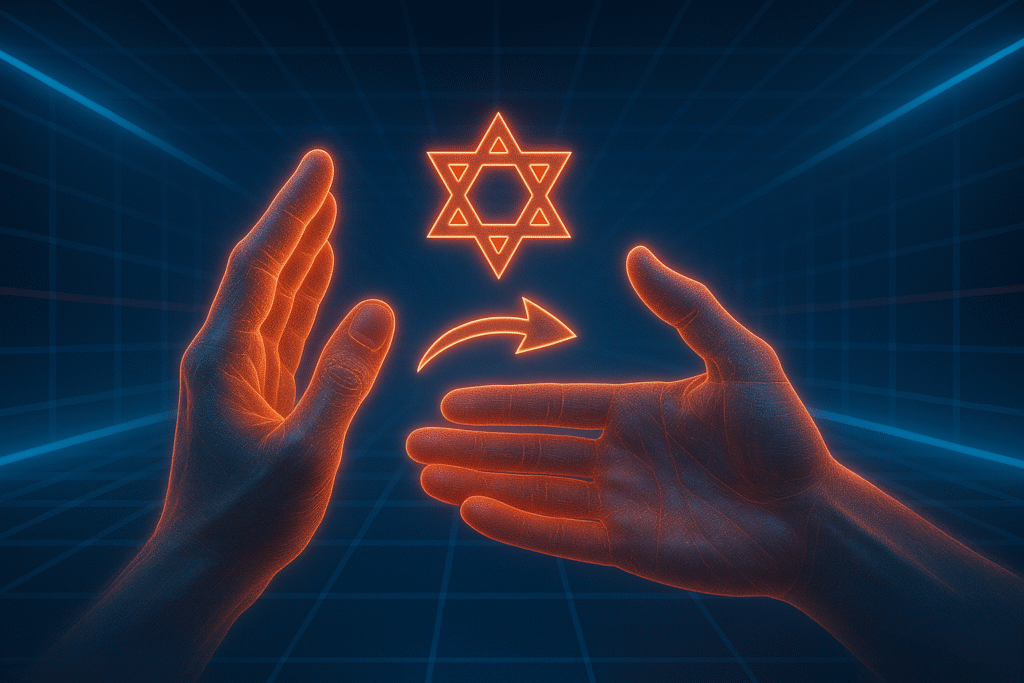Joshua Friedman’s spiritual path was remarkably complex before ultimately leading him to Israel at age 43. Born to secular academics in Boston with no religious affiliation, he grew up in an intellectual household that approached religion as a sociological phenomenon rather than a personal practice. His parents, both professors who identified culturally as Jewish but rejected religious observance, raised him with knowledge of his Jewish heritage but provided no religious education.
In college, Joshua began exploring spirituality through various traditions—initially studying Eastern philosophies before becoming attracted to the certainty and community offered by an evangelical Christian campus group. At 22, he converted to Christianity, finding meaning in its structured theology and community during a period of personal uncertainty. For nearly nine years, he was an active member of an evangelical church, completing a master’s degree in Christian theology and even considering becoming a pastor.
At 31, his spiritual journey took another turn when academic research into early Christianity led him to study Second Temple Judaism. What began as historical curiosity evolved into deeper questions about his own heritage. Conversations with a reform rabbi who patiently addressed his questions about Jewish theology awakened a growing sense that he had been searching for something that was part of his heritage all along.
Over the next three years, Joshua gradually disengaged from his church while studying extensively with two rabbis—first Reform, then Conservative. His theological perspectives shifted significantly as he found in Judaism a spiritual approach that aligned with his intellectual temperament and cultural background. At 35, after completing a comprehensive conversion program, Joshua formally converted to Judaism through a Conservative Beth Din (rabbinical court).
Following his conversion, Joshua became deeply involved in Jewish life—studying Hebrew, observing Shabbat and holidays, teaching adult education classes at his synagogue, and eventually serving on his synagogue board. Eight years after his conversion, he began considering aliyah to deepen his Jewish journey.
His application faced extraordinary complexities due to:
- His previous conversion to Christianity raising concerns about sincerity and permanence
- The 1970 amendment to the Law of Return excluding those “who have been members of another religion”
- Questions about whether his case would create a problematic precedent
- His Conservative conversion not being recognized by Israel’s Orthodox Rabbinate for religious purposes
- Concerns about his complex religious history indicating potential instability
The resolution came through the application of the “Religious Journey Discernment” protocol established in 2016. Joshua’s attorney presented extensive evidence demonstrating the authentic nature of his Jewish commitment:
- Conversion Documentation and Context
- Complete records of his formal Conservative conversion process
- Documentation showing the rigorous 18-month study program he completed
- Statements from the rabbis who guided his conversion explaining its thorough nature
- Analysis of the Conservative Beth Din’s composition and procedures
- Expert testimony on the theological significance of his return to his ancestral faith
- Post-Conversion Jewish Life
- Eight years of documented consistent Jewish practice
- Leadership roles in his Jewish community
- Testimonials from numerous community members about his commitment
- Evidence of his Hebrew studies and Jewish education
- Documentation of his observance of Jewish holidays and lifecycle events
- Religious Journey Understanding
- A scholarly personal statement articulating his theological evolution
- Psychological assessment confirming the authentic nature of his spiritual development
- Formal documentation of his withdrawal from Christian affiliation
- Rabbinical analysis of his case in the context of Jewish concepts of return
- Letters from Jewish community members familiar with his entire religious journey
- Legal Context Analysis
- Detailed legal brief examining the intent of the 1970 amendment
- Analysis of three previous similar cases where aliyah had been granted
- Expert testimony on the distinction between converts to Judaism with previous Christian experience versus born Jews who converted away
- Documentation that he had no Jewish birth identity to “convert away from” originally
- Evidence that his Jewish identity had remained stable for eight years
After an extensive nine-month review, the Ministry of Interior approved Joshua’s application, stating: “The Law of Return’s amendment excluding those ‘who have been Jews and have voluntarily changed their religion’ must be interpreted in historical context. It was intended to address cases of Jews by birth who had converted away from Judaism, not to create a permanent barrier for sincere converts to Judaism who had previously explored other faiths. The applicant’s eight years of consistent Jewish identification and practice following his conversion demonstrate the authentic and durable nature of his Jewish commitment.”
Joshua successfully made aliyah in 2023 and settled in Ra’anana. He works as a technical writer while continuing his Jewish studies. Though aware that his Conservative conversion is not recognized for religious purposes by the Rabbinate, he has found community within Israel’s diverse religious landscape. His case established that previous religious exploration need not permanently disqualify someone from making aliyah when followed by sincere conversion to Judaism and sustained Jewish practice over a significant period.
